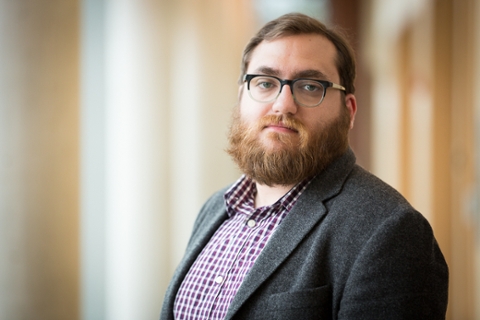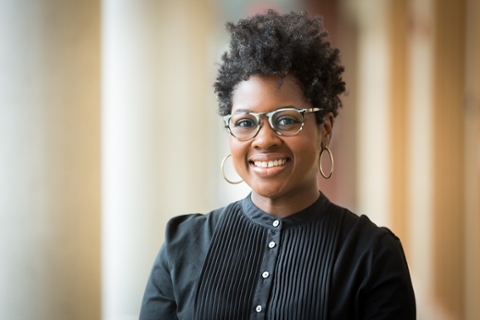Sixteen Doctoral Candidates Receive Mellon Dissertation Research Grants
May 18, 2018
Simon Goodacre | Graduate School of Arts and Sciences
The Graduate School of Arts and Sciences has awarded Dissertation Research Grants to sixteen doctoral candidates. The award, which is funded by the Mellon Foundation, enables our scholars to conduct dissertation research, including preliminary, exploratory research. The funding can be used to cover research-related travel expenses, including airfare, train fare, lodging, food, archive and library access fees, special equipment, software, and other expenditures associated with research. The typical grant is $3,000, but may be adjusted depending on the needs of individual students.
The 2018 recipients of the Mellon Dissertation Research Grants are:
- Sean Beebe, History
- Christiana Botticello, Politics
- Hanh Bui, English
- Richard Chowenhill, Music Composition and Theory
- Jara Connell, Anthropology
- Daniella Gati, English
- Matthew Heck, Musicology
- Nataliia Laas, History
- Courtney Pina Miller, English
- Brenden O’Donnell, English
- Sarah Shofield-Mansur, Anthropology
- Brian Sears, Music Composition and Theory
- Max Seidita, Anthropology
- Calvin Snyder, History
- Kelly Stedem, Politics
- Kendra Yarbor, Near Eastern and Judaic Studies
We asked some of the recipients to tell us a little about their dissertations and how they plan to use the funding from this award:
Strategies of Nation-Building and Attachment to the State in the Baltic Republics (1991-2017)
What strategies of nation-building are most successful in developing attachment to the state among minority groups in culturally diverse states? The conventional wisdom among political scientists is that the democratic state holds together best by accommodating minority differences and guaranteeing minority group rights against majority rule, often by devolving power to regions where ethno-cultural minority groups are concentrated. Yet this strategy clearly backfires in some cases where institutional accommodation has empowered political entrepreneurs to launch more sophisticated separatist campaigns. I aim to address these questions at the macro-level through an empirical examination of nation-building strategies in the Baltic states (Lithuania, Latvia, and Estonia) since the collapse of the Soviet Union and at the micro-level through interviews with members of the chief minority groups in each of these states. Empirically, the research question takes the form: how have state strategies of nation-building supported or undermined the development of common-state attachments in the Baltic states since the fall of the Soviet Union?
I plan to use the funds to travel to Lithuania, Latvia, and Estonia to conduct interviews with members of ethno-cultural minority groups. I will further gather evidence to construct a detailed account of the nation-building policies implemented in these three states since 1991 and collect data from state agencies to evaluate the state of cultural integration more broadly.
Market Research without a Market: Command Economy and Consumer Demand in the USSR (1953-1991)
My project examines market research in the Soviet Union from Stalin’s death in 1953 to the regime’s collapse in 1991. Market research resulted from a new consumerist direction in Soviet politics and society from the mid-1950s on, when political leaders determined to raise the standard of living and increase the output in consumer goods, thereby developing a distinct Soviet consumer culture. But this new policy raised the question of how state planners should measure consumer demand in an economy with fixed prices. The new field of market research was to provide the answer. The dissertation will first examine the community of market research specialists: their professional development, methodologies of information-gathering, and research findings. A second task is to consider how planners, central ministerial authorities, regional politicians, firm managers, wholesalers and retailers used the market research results in economic policies. The dissertation will then show how market research shaped consumer rights activism in 1986-1991. Contrary to what earlier scholarship assumed, centralized planning did not ignore prospective consumer demand and marketing techniques. My research suggests that the state’s awareness of potential demand configured and legitimized specific decisions on the production and distribution of consumer goods.
I will use the Mellon Dissertation Research Grant to collect primary sources in Moscow this fall. I am especially excited to work in the Russian State Archive of the Economy, which has the main collections on market research.
Modernist Imaginings of the Working Class
Literary modernism (1890-1945) has long been criticized as elitist—many of the movement’s writers and artists benefited from substantial financial support, elite educations, and high society networks. Surprisingly, research about the relationship between modernism and class is distinctly underdeveloped. This is especially puzzling given the widely-held belief that modernist work, perhaps unlike the literary traditions it so self-consciously breaks from, has explicit political and historical imperatives. To interrogate and fill this critical gap, my dissertation investigates transatlantic (American, British, and Irish) modernist imaginings of the working class. My project examines how modernist texts contain class dissonance, (re)imagine the working class, and aestheticize early twentieth century class tensions, while also considering how conceptions of race, gender, sexuality, and nationality complicate and intersect with notions of class identity. My project’s ultimate goals are to consider modernism’s propensity to make art from the experience of class, how modernist literature recasts/reorganizes class difference, how class troubles bourgeois/elite(ist) writers, and specifically, how class is poetically and fictively articulated, embodied, and spatialized.
With the generous support of the Mellon Foundation, I will spend time this summer in the U.K. I am presenting a paper at The Working-Class Avant-Garde Symposium at London South Bank University. While in London, I intend to spend several days conducting research at The British Library, which owns several collections of modernist writers’ manuscripts and personal papers (e.g., Virginia Woolf, T.S. Eliot, and W.H. Auden). I will also spend time in Salford, England, examining one-of-a-kind archival materials The Working Class Movement Library. This unique library houses journals, newspapers, pamphlets, leaflets, pottery, photographs, personal papers, trade union emblems, and other intriguing working class artifacts. In addition, a chapter of my dissertation examines servant figures in modernist texts, so I will also use this grant to visit British estates that have preserved servant quarters to conduct research on how domestic labor was spatialized in the British home.

Electroacoustic Performance Practice: Bridging the gap between performers and technology, and the pursuit of synchronicity
I will research potential methods of interaction between performers and technology in “mixed music” (music featuring live instruments and electronics), specifically how these different methods affect the performer’s virtuosity and freedom of interpretation, as well as reception and perceived success of integration by the audience. This grant will fund my trip to the Institut de Recherche et Coordination Acoustique/Musique (IRCAM) this summer for the Manifeste Academy, where I will pursue research related to interactive performance systems, integration of performers and electronics, and strategies for creating new interfaces for the execution of electroacoustic music. I greatly appreciate the support of the Carnegie Mellon Foundation, Brandeis University, and the Graduate School of Arts and Sciences for this opportunity to pursue my research.

Economic integration on the fringes of political authority at Flores Magón, Chiapas, Mexico
My research addresses the processes of economic and social integration of communities lying outside the spatial and political limits of Classic period Maya Kingdoms (250 – 900 C.E.). I investigate this topic through archaeological excavations at the ancient Maya site of Flores Magón, Chiapas, Mexico. Flores Magón is situated at the nexus of three large Maya kingdoms, where its populace would likely have been excluded from the resources and benefits such as security and economic opportunity associated with participation in larger political entities. The Mellon Dissertation Research Grant has provided me the opportunity to investigate these topics through a combination of archaeological excavations at the site of Flores Magón and the application of more scientific methodologies to archaeological materials. While my research directly concerns the ancient Maya, my goal is to contribute a necessary long-term perspective to contemporary problems of community development, integration, and security in the absence of state intervention.

Patterns of Disruption: Judaism and Islam in Black American Life
My dissertation is a comparative examination of the social histories of two religious groups that developed among African Americans and other people of African descent in the United States: the Commandment Keepers Ethiopian Hebrew Congregation (Black Jews) of Harlem, New York and the Nation of Islam (Black Muslims) of Detroit, Michigan. Appearing in the early twentieth century, the presence of Black people claiming to be Jews and Muslims disrupted existing perceptions of who was a Jew and who was a Muslim in the religious worlds that members of these groups sought to be a part of. The Commandment Keepers and the Nation of Islam held the conviction that their racial blackness connected them to Judaism and Islam, respectively. My research examines their belief systems and explores how their mundane and sacred worlds were interconnected. The definition of religion, the construction of the modern self in the Black American experience and the consequences of the making of racialized religious communities emerge as the dissertation’s analytical frameworks. A critical part of my analysis will be placing Black Jews and Black Muslims into the larger African American religious narrative, one that was and still is largely influenced by Christianity.
With the support of the Mellon Dissertation Research Grant, I plan to visit the National Museum of African American History and Culture in Washington, D.C. to see how this religious history has been publicly displayed in a cultural institution such as a museum.






